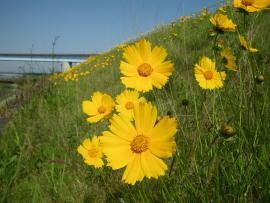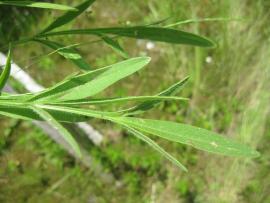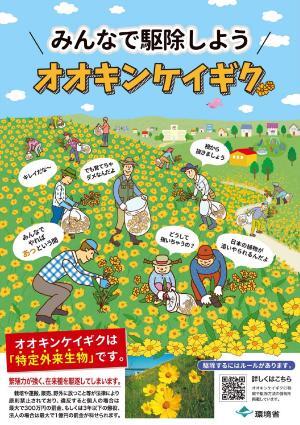About the Invasive Alien Species "Large-flowered Tickseed"
The large-flowered tickseed, which blooms from May to around July, is a plant of the Asteraceae family with vivid yellow flowers, and can be seen along roadsides and riverbanks within Inagi City.
The large-flowered tickseed is a highly invasive plant that outcompetes native species and is designated as a "Specified Invasive Alien Species" under the Invasive Alien Species Act due to its potential serious impact on Japan's ecosystem. Cultivation, transportation, sale, and release into the wild are generally prohibited.
What are Invasive Alien Species?
Invasive alien species are non-native species (originating from overseas) that have been designated as organisms that cause or may cause harm to ecosystems, human life and health, or agriculture, forestry, and fisheries.
Species designated as Invasive Alien Species are, in principle, prohibited from being bred, sold, stored, transported, imported, transferred, sold, or released into the wild based on the provisions of the Invasive Alien Species Act.
Violating the Invasive Alien Species Act may result in a fine of up to 3 million yen or imprisonment for up to 3 years for individuals, and penalties of up to 100 million yen for corporations.
For details on designated invasive alien species, please refer to the Ministry of the Environment's website.
Characteristics of Coreopsis
Flower Characteristics

- A flower head resembling a cosmos, with a diameter of 5cm to 7cm (a single flower attached to the tip of the stem)
- The color of the petals (ligulate flowers) is yellow-orange, and the central part of the flower (tubular flowers) is the same color
- The tips of the petals split irregularly into 4 to 5 parts
Leaf Characteristics

- Long and narrow spatula-shaped, opposite leaves (leaves on both sides of the stem)
- Both sides of the leaf have coarse hairs, and the edges of the leaf are smooth (no serrations)
- The width of the widest part of the leaf is about 1 cm
- Mature leaves are divided into 3 to 5 lobes. The lobes are oval-shaped
Please cooperate in the eradication of the large-flowered tickseed
For the conservation of the ecosystem, if the large-flowered tickseed is growing, please cooperate in its removal.

Extermination Methods
1. Since it is a perennial plant, it will grow again if the roots remain, so pull out the entire plant from the base.
2. Place the seeds and roots in a bag without dropping them, seal it tightly, and let them dry.
3. Please remove as much soil as possible and dispose of it as Burnable Garbage.
To view the PDF file, you need "Adobe(R) Reader(R)". If you do not have it, please download it for free from Adobe website (new window).
Please let us know your feedback on how to make our website better.
Inquiries about this page
Inagi City Department of Urban Environmental Development, Greenery & Environment Division
2111 Higashi-Naganuma, Inagi City, Tokyo 206-8601
Phone number: 042-378-2111 Fax number: 042-378-9719
Contact the Greenery and Environment Division, Urban Environment Management Department, Inagi City


















